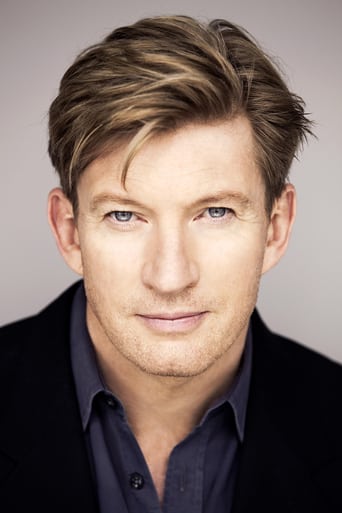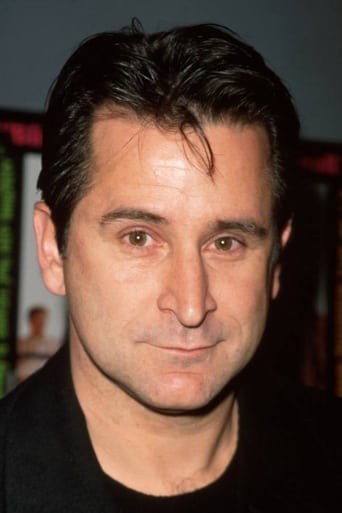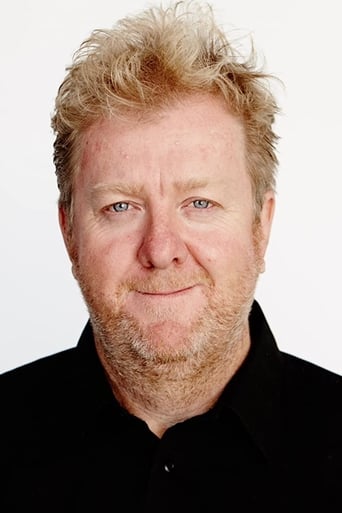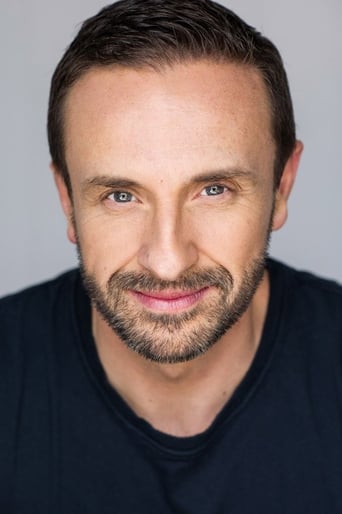Intcatinfo
A Masterpiece!
ChanFamous
I wanted to like it more than I actually did... But much of the humor totally escaped me and I walked out only mildly impressed.
Kamila Bell
This is a coming of age storyline that you've seen in one form or another for decades. It takes a truly unique voice to make yet another one worth watching.
Rosie Searle
It's the kind of movie you'll want to see a second time with someone who hasn't seen it yet, to remember what it was like to watch it for the first time.
Enchorde
Recap: Jim Doyle is a mathematician specialized in chaos and fractal theory. He claims that he has developed a program that can predict the fluctuations on the stock market. For Simon O'Reily, a bank executive under pressure to produce more income to the bank that temptation is too much. Boyle is hired and put on a secret project to refine his program. And when the program predicts a major market crash in the near future, O'Reily sees the possibility to earn a fortune. Forget the costs, forget ethics and laws. Profit must be maximized.Comments: How do you make mathematics sexy? Simple, three steps. You put them in a program, add a lot of graphics and visual aid, and then throw in the promise of ridiculous amounts of money. Then you take this to the evil bank, and hey, you got a thriller.Well, the movie is not only about math, even if it looks like it in the beginning? The fundament is humans and one of our sins, greed. To profit on the expense of others. But with greed also comes deception and revenge, so you better look out and stay sharp. The Bank is a movie that profits from these three pretty basic concepts, greed, deception and revenge.It's a movie that starts out simple, but soon something looks amiss, and thereafter very little seems to be what it wants to look like. There are a lot of false façades but for the movies sake, a few too many are a little too transparent. Some twists that should have been surprising are revealed or seen through too early. A lot of suspense and quality are lost this way.Also there are some bits missing. The main plot, with the mathematics, are never fully explained. It can't be, because to explain that math simply would be taking too long and bore most of the audience out of their minds. But to have such a integral part of the plot unexamined the deception becomes very shallow, and less intriguing. In addition there are a little too many points about how Boyle makes his getaway that are left out. The end is therefore not the suspenseful high point of the movie that it should be.A decent movie though, but nothing to look for in the store's shelves. Fun to see Wenham in a different role a little before his role as Faramir in LOTR.5/10
Lechuguilla
Another film about corporate power and greed, "The Bank" puts a slightly different spin on the subject. Set in Melbourne, a young Ph.D. mathematician named Jim Doyle (David Wenham) uses fractal theory, similar to chaos theory, to predict changes in stock markets. A ruthless, unethical CEO named Simon O'Reilly (Anthony LaPaglia) hires Doyle to employ his equations to benefit Simon's bank which, in a separate development, tries to swindle a working class couple out of their belongings. "The Bank", obviously, does not portray financial institutions favorably.The tone here is cold and technical, with dialogue that includes lots of techno-babble. And there are some potent lines, like when Simon spews out his politics to Jim's girlfriend. "We (the banks) can react against any government until they do exactly what it is we want them to do ... We have now entered the age of corporate feudalism ..."; the girlfriend responds angrily: "What do you call yourselves, bastards without borders?"Indeed, the story takes Oliver Stone's "Wall Street" a step further. Whereas Gordon Gekko's mantra was personal greed, Simon's goal is nothing less than global domination, a world run by ruthless banking executives.The film's plot is not altogether clear when first viewed, as a result of flashbacks. And some plot points are left unexplained, perhaps intentionally. Also, I must say that the story, in its totality, is somewhat implausible. But there's plenty of tension as we approach the climax, partly as a result of the film's splendid graphics.And those graphics, in the form of line schematics, are the portal from which we descend into fractal theory, a veritable black hole for some of the characters. A couple of subtle references to Hal9000 solidify a black box future, amplified by color cinematography that is dark and menacing.We've seen this overall concept before, in other films. It's hardly original. And the characters are not really sympathetic. Still, "The Bank" is technically well made. For most viewers, Simon's motivations are chilling. They remind us of what can happen when big, powerful institutions are given unlimited control.
vittorio_bollo
I got the DVD out of this 2001 film with some anticipation. After all, the credentials of the film looked really good: an Australian film, starring Anthony LaPaglia, a diatribe on global corporatism and, especially, the banking system and, to top it all, a winner for Best Original Screenplay at the prestigious AFI Awards. Well, unfortunately, the film was, in its entirety, very disappointing. For one, it did not deserve to win Best Screenplay at the AFI or any other awards show for that matter. Conceptually the film did indeed have its merits but, alas, that does not necessarily a great screenplay make. What the film had brimming in promise (read: concept), it lacked sorely in true substance and, above all, plausibility (read: a good story). The plot line was simply not entirely believable and, quite frankly, it wrapped itself up just a tad too neatly at the end. For example, the lead character's true identity (and one of the turning points upon which the film's so-called 'final twist' relied) was executed very clumsily and unconvincingly. This screenplay worked neither as taut social commentary or satire nor as a dark drama/thriller and, in failing to work within a strong genre, it completely lost its impact. The script, whilst having some notable one-liners and observations about the banking/corporate world was, still quite poor in terms of real plot development and emotional buy-in.The direction by director-writer Robert Connolly was competent without ever excelling in terms of plot revelation, mood depiction or genre-shaping flow. Simply put, the film lacked real drive, emotion or excitement and, frankly, the blame must rest squarely with the director; a director that, whilst seemingly assured and technically sound, lacked vision and verve in his execution here. As a result, the film is strangely flat, oddly devoid of any exciting build-up and simply does not linger in the memory.Technically, the film cannot be outright faulted, but neither does that make it technically excellent. The photography by Tristan Milani was appropriately severe and steely-blue. Yet, the depiction of a corporate-geared Australian city (for a non-Australian, one struggles to know whether it's Sydney or Melbourne?) without real identity and sense of place was, in fact, a negative for the film's sense of mood depiction. The blame there should lie with director and cinematographer. The editing, particularly in regard to the computer graphics and F/X, had some merit, although, once again, a sense of verve was required here too. The worst culprit, however, was the at times clanging and even jarring musical score by Alan John. This is one score that ranged from being eerily excellent to downright annoying and distracting; ultimately, any excellence thereof was diluted. In terms of acting, the saving grace of this film was indeed Anthony LaPaglia. His presence was broody, exacting and menacing, without resorting to the caricature of what a rich, corporate asshole should be portrayed. Kudos to him for a retrained, pitch-perfect performance. Unfortunately, the acting by the other actors in the film was far from riveting or even that good; a surprising letdown hardly ever seen in Australian cinema. The lead actor, David Wenham, had some moments of adequate intensity and character truth but, as a whole, he came across as insipid and unconvincing as a clearly left-leaning mathematical genius. Sibylla Budd as the (totally unnecessary and badly written) love interest simply came across as a very poor actress. She flinched and fluttered her eyelids at all the wrong moments and the intensity of her fledgling and confused feelings for our intrepid lead man were simply unconvincing and untouching.The film's highlights? LaPaglia, some of the core social and banking-related issues that are wittily remarked upon and a (limited) amount of interesting social commentary. But, ultimately, this was a film that could have been, should have been, and simply fails. It had such contemporary, relevant and dynamic themes to run with and yet, throughout, it came across as merely derivative, unconvincing and even quite dull. This all made "The Bank" an even bigger letdown than most other disappointing films and its critical/award success even more puzzling and quite undeserving. The pedigree was all there but the chance to be a real winner of a film was simply lost.
Dave (Davo66)
Brilliant Movie. Won best screenplay at the Australian Film Institute awards in 2001 and was nominated for another 9 AFI awards.From the opening credit sequence reminscent of the work done by Graphic design legend on Alfred Hitchcocks Verigo, and with a score reminiscent of and inspired by another one of Hitchcocks protege's Bernard Hermann, this movie really grabs your attention right from the start.Another Brilliant debut effort for an Australian Director/writer, Robert Connoly has created a film that rates as highly as Gregor Jordan's debut effort for "Two Hands".Brilliant acting from Anthony LaPaglia as the arch villain of the piece and David Wenham's portrayal of the hero of the movie is the best acting he has done since "The Boys", Sybilla Budd from high rating Australian TV show "The secret life of us" makes an impressive film Debut as the hero's love interest.With lines like CentaBank CEO's, Simon O'Reilly (Anthony LaPaglia) "I'm like God but with a better suit" emanating from the script it is not hard to see why it won best screenplay.This movie reminds me of a cross between Orson Welles "Citizen Kane" and Alfred Hitchcocks "Vertigo" and "North by Northwest" and is a proud addition to my home DVD collection. I rate this movie as a 10/10 for a debut effort for a Director/Writer.






